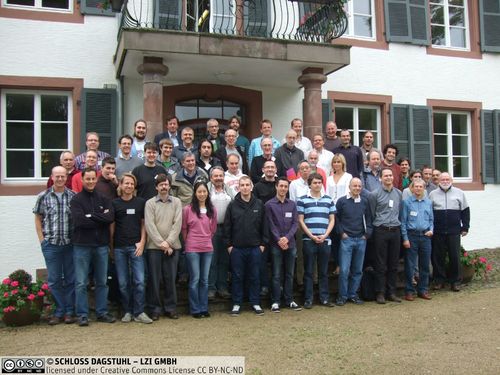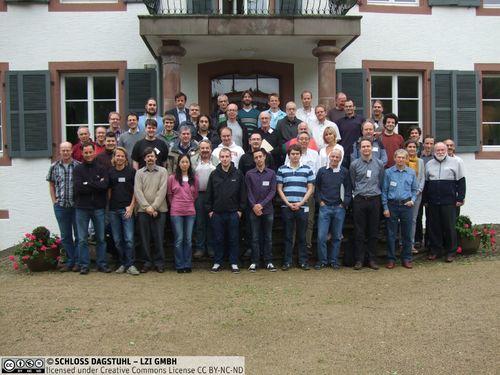Dagstuhl-Seminar 12391
Algorithms and Complexity for Continuous Problems
( 23. Sep – 28. Sep, 2012 )
Permalink
Organisatoren
- Alexander Keller (NVIDIA GmbH - Berlin, DE)
- Frances Y. Kuo (UNSW - Sydney, AU)
- Andreas Neuenkirch (Universität Mannheim, DE)
- Joseph F. Traub (Columbia University - New York, US)
Kontakt
- Andreas Dolzmann (für wissenschaftliche Fragen)
- Annette Beyer (für administrative Fragen)
Programm
This was already the 11th Dagstuhl Seminar on Algorithms and Complexity for Continuous Problems over a period of 21 years. It brought together researchers from different communities working on computational aspects of continuous problems, including computer scientists, numerical analysts, applied and pure mathematicians. Although the seminar title has remained the same many of the topics and participants change with each seminar and each seminar in this series is of a very interdisciplinary nature.
Continuous computational problems arise in diverse areas of science and engineering. Examples include path and multivariate integration, approximation, optimization, as well as operator equations. Typically, only partial and/or noisy information is available, and the aim is to solve the problem within a given error tolerance using the minimal amount of computational resources. For example, in high-dimensional integration one wants to compute an varepsilon-approximation to the integral with the minimal number of function evaluations. Here it is crucial to identify first the relevant variables of the function. Understanding the complexity of such problems and construction of efficient algorithms is both important and challenging.
The current seminar attracted 51 participants from more than 10 different countries all over the world. About 30% of them were young researchers including PhD students. There were 40 presentations covering in particular the following topics:
- Biomedical learning problems
- Random media
- Computational finance
- Noisy data
- Tractability
- Quantum computation
- Computational stochastic processes
- High-dimensional problems
The work of the attendants was supported by a variety of funding agencies. This includes the Deutsche Forschungsgemeinschaft, the Austrian Science Fund, the National Science Foundation (USA), and the Australian Research Council. Many of the attendants from Germany were supported within the DFG priority program SPP 1324 on "Extraction of Quantifiable Information from Complex Systems", which is strongly connected to the topics of the seminar.
As always, the excellent working conditions and friendly atmosphere provided by the Dagstuhl team have led to a rich exchange of ideas as well as a number of new collaborations. Selected papers related to this seminar will be published in a special issue of the Journal of Complexity.
- Christoph Aistleitner (TU Graz, AT) [dblp]
- Martin Altmayer (Universität Mannheim, DE)
- James M. Calvin (NJIT - Newark, US) [dblp]
- Ronald Cools (KU Leuven, BE) [dblp]
- Stephan Dahlke (Universität Marburg, DE) [dblp]
- Thomas Daun (TU Kaiserslautern, DE)
- Steffen Dereich (Universität Münster, DE) [dblp]
- Nicolas Döhring (TU Kaiserslautern, DE)
- Massimo Fornasier (TU München, DE) [dblp]
- Stefan Geiss (Universität Innsbruck, AT) [dblp]
- Michael Gnewuch (Universität Kiel, DE) [dblp]
- Mario Hefter (TU Kaiserslautern, DE) [dblp]
- Stefan Heinrich (TU Kaiserslautern, DE) [dblp]
- Aicke Hinrichs (Universität Jena, DE) [dblp]
- Peter Kritzer (Universität Linz, AT) [dblp]
- Thomas Kühn (Universität Leipzig, DE) [dblp]
- Frances Y. Kuo (UNSW - Sydney, AU) [dblp]
- Gunther Leobacher (Universität Linz, AT) [dblp]
- Peter Mathé (Weierstraß Institut - Berlin, DE) [dblp]
- Klaus Meer (BTU Cottbus, DE) [dblp]
- Thomas Müller-Gronbach (Universität Passau, DE) [dblp]
- Valeriya Naumova (RICAM - Linz, AT)
- James Nichols (UNSW - Sydney, AU) [dblp]
- Erich Novak (Universität Jena, DE) [dblp]
- Dirk Nuyens (KU Leuven, BE) [dblp]
- Jens Oettershagen (Universität Bonn, DE)
- Anargyros Papageorgiou (Columbia University - New York, US) [dblp]
- Sergei Pereverzyev (RICAM - Linz, AT) [dblp]
- Iasonas Petras (Columbia University - New York, US)
- Friedrich Pillichshammer (Universität Linz, AT) [dblp]
- Leszek Plaskota (University of Warsaw, PL) [dblp]
- Pawel Przybylowicz (AGH Univ. of Science & Technology-Krakow, PL) [dblp]
- Klaus Ritter (TU Kaiserslautern, DE) [dblp]
- Daniel Rudolf (Universität Jena, DE) [dblp]
- Otmar Scherzer (Universität Wien, AT) [dblp]
- Wolfgang Ch. Schmid (Universität Salzburg, AT)
- Reinhold Schneider (TU Berlin, DE)
- Christoph Schwab (ETH Zürich, CH) [dblp]
- Winfried Sickel (Universität Jena, DE) [dblp]
- Ian H. Sloan (UNSW - Sydney, AU) [dblp]
- Rob Stevenson (University of Amsterdam, NL)
- Shu Tezuka (Kyushu University - Fukuoka, JP)
- Joseph F. Traub (Columbia University - New York, US) [dblp]
- Mario Ullrich (Universität Jena, DE) [dblp]
- Tino Ullrich (Universität Bonn, DE) [dblp]
- Jan Vybíral (TU Berlin, DE) [dblp]
- Grzegorz Wasilkowski (University of Kentucky - Lexington, US) [dblp]
- Markus Weimar (Universität Jena, DE) [dblp]
- Henryk Wozniakowski (Columbia University - New York, US) [dblp]
- Larisa Yaroslavtseva (Universität Passau, DE) [dblp]
- Marguerite Zani (University Paris-Est - Créteil, FR) [dblp]
Verwandte Seminare
- Dagstuhl-Seminar 9116: Algorithms and Complexity of Continuous Problems (1991-04-15 - 1991-04-19) (Details)
- Dagstuhl-Seminar 9242: Algorithms and Complexity for Continuous Problems (1992-10-12 - 1992-10-16) (Details)
- Dagstuhl-Seminar 9442: Algorithms and Complexity for Continuous Problems (1994-10-17 - 1994-10-21) (Details)
- Dagstuhl-Seminar 9643: Algorithms and Complexity for Continuous Problems (1996-10-21 - 1996-10-25) (Details)
- Dagstuhl-Seminar 98201: Algorithms and Complexity for Continuous Problems (1998-05-18 - 1998-05-22) (Details)
- Dagstuhl-Seminar 00391: Algorithms and Complexity for Continuous Problems (2000-09-24 - 2000-09-29) (Details)
- Dagstuhl-Seminar 02401: Algorithms and Complexity for Continuous Problems (2002-09-29 - 2002-10-04) (Details)
- Dagstuhl-Seminar 04401: Algorithms and Complexity for Continuous Problems (2004-09-26 - 2004-10-01) (Details)
- Dagstuhl-Seminar 06391: Algorithms and Complexity for Continuous Problems (2006-09-24 - 2006-09-29) (Details)
- Dagstuhl-Seminar 09391: Algorithms and Complexity for Continuous Problems (2009-09-20 - 2009-09-25) (Details)
- Dagstuhl-Seminar 15391: Algorithms and Complexity for Continuous Problems (2015-09-20 - 2015-09-25) (Details)
- Dagstuhl-Seminar 19341: Algorithms and Complexity for Continuous Problems (2019-08-18 - 2019-08-23) (Details)
- Dagstuhl-Seminar 23351: Algorithms and Complexity for Continuous Problems (2023-08-27 - 2023-09-01) (Details)
- Dagstuhl-Seminar 27341: Algorithms and Complexity for Continuous Problems (2027-08-22 - 2027-08-27) (Details)
Klassifikation
- Data Structures/Algorithms/Complexity
Schlagworte
- Biomedical learning problems
- Random media
- Computational finance
- Noisy data
- Tractability
- Quantum computation
- Computational stochastic processes
- High-dimensional problems



